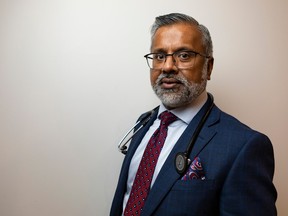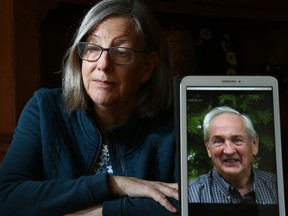As more medically assisted deaths are taking place than ever in Canada, the country is in the midst of a contentious debate about whether MAiD laws are expanding too far, too fast.
~~ recommended by newestbeginning ~~

Dr. Viren Naik underestimated how difficult it would be to provide medical assistance in dying to a patient for the first time.
It was six years ago, and one of the first MAiD provisions ever done in Canada following the decriminalization of assisted dying by the Supreme Court in 2015. Naik, an anesthesiologist and former vice president at The Ottawa Hospital, had just taken on the role of medical director at the Champlain regional MAiD network.
He was the only local doctor providing medical assistance in dying at the time. There was no pool of experienced colleagues to turn to for advice or moral support.
“It was so different than anything I had ever been asked to do as a doctor before,” he said. “We have experience withdrawing care. But this is purposely ending life. That is something most human beings aren’t programmed for.
“I am pretty resilient, but it impacted me.”
He knew he was providing a medical service patients had a legal right to, but he didn’t initially have a clear sense of why MAiD is an important choice for Canadians.
Since then, he has been surprised and moved by his experiences — being greeted at the front door by a patient who insisted on making breakfast before the procedure, being handed a glass of prized 50-year-old vodka by a husband after his wife’s MAiD death, witnessing outpourings of love at living wakes and shared grief.
He is now one of the busiest MAiD providers in the region. The role has also given him clarity about why it is important.
What comes next is less clear.
As more medically assisted deaths are taking place than ever in Canada, the country is in the midst of a contentious debate about whether MAiD laws are expanding too far, too fast.
While growing numbers of Canadians accept MAiD as a medical choice to relieve suffering at the end of life, less accepted are expanded MAiD laws that allow people whose death is not reasonably foreseeable and, beginning next year, those whose sole medical condition is mental illness to apply. Among concerns are whether poverty, a lack of adequate housing and poor access to timely medical care are driving people to seek medical assistance in dying.
Health professionals are grappling with the same questions. And they could be key to how MAiD unfolds in the coming years.
For some doctors, changes to Canada’s medical assistance in dying laws are simply “a bridge too far,” said Naik. “It’s not what they signed up for.”
The debate is fuelled by alarming individual stories.
* The 52-year-old Ontario man with excruciating back pain who applied for MAiD, not because of the pain, but because he was in danger of becoming homeless, which he feared more than death. He changed his mind after people from around the world, moved by his plight, raised more than $60,000 to help him.
* A Toronto woman with severe chemical sensitivities who chose MAiD after her failed search for affordable housing free of smoke and chemical cleaners, CTV reported.
* Members of the Canadian military who have claimed that caseworkers suggested MAiD when they came forward seeking support for post-traumatic stress disorder.
Medical professionals who assess patients and provide MAiD could put the brakes on the expansion in some parts of the country as they are not required to assess or provide medical assistance in dying to more complex patients, the so-called track two patients, if they are not willing.
Until March 21, 2021, only people whose deaths were reasonably foreseeable, so-called track one cases, were eligible to apply for MAID. Track two cases include people whose deaths are not reasonably foreseeable, who became eligible to apply for MAiD in 2021. It also includes people whose sole medical condition is mental illness, who will become eligible for MAiD next spring.
In the Champlain region, which includes Ottawa, the majority of MAiD providers have already expressed unease with changes to the legislation.
Upwards of 80 physicians have signed up to provide MAiD across the Champlain region, a number that has grown steadily over the years and increasingly includes family doctors who want to assist patients they have known for years.
But only four physicians across the region have agreed to take on track two cases, said Naik. And no one has yet stepped forward to assess or be a provider for cases in which mental health is an applicant’s only medical condition.
“Something will be legislated under the law but we will be challenged with being able to offer it,” he said. “Policy and legislation are moving at warp speed versus our ability to deliver.”
Unlike some colleagues, Naik sees a role for MAiD in track two cases, though he thinks their numbers will be limited. “There are some patients, when you see the case, you understand this is why track two exists.”
He describes a case in which a patient had chronic pain for decades. The person was investigated by all sorts of specialists and even underwent surgery to relieve the pain, but to no avail.
“Here you have got a patient telling you their pain is 10 out of 10 most of the day, every day,” he said. “They have explored everything medicine has to offer. Their family and loved ones understand what they are going through and are supportive.
“This is the kind of case I understand.”
Track two cases include more safeguards. Among them: patients must wait at least 90 days after being assessed, and the person “must be informed of available and appropriate means to relieve their suffering, including pain services, counselling, mental health and disability support services, community services, and palliative care, and must be offered consultations with professionals with expertise in those services.”
The debate comes as more Canadians than ever are embracing MAiD at the end of life.
In 2021, 10,064 Canadians chose medically assisted death, making up 3.3 per cent of all deaths in the country, a number that has grown steadily since 2016.
“More and more people know someone who had MAiD,” said Naik.
In 2021, the average age of people who received medical assistance in dying was 76.3 and the most common underlying health issue was cancer.
More often than pain, patients talk about wanting to regain some control when they seek MAiD, say those involved in the regional program.
It has shifted the way some people think about death, with MAiD becoming part of end-of-life conversations between patients and their doctors, within families, among neighbours, even in some religious organizations.
Patients themselves have helped prompt those conversations.
A year ago, retired Ottawa social worker Gail Dawson fulfilled her father’s last request by talking to this newspaper about his death by MAiD. He worried that not enough people knew it was an option.
“It was beautiful, it was peaceful, it was pain-free. It was the way he wanted, the time he wanted, the people around him he wanted with him,” she said.

In 2020, Ottawa educator and outdoorsman Clarence Byrd underwent MAiD while suffering from terminal cancer. His wife of 43 years, also suffering from terminal cancer, had died with medical assistance seven months earlier.
“There was tremendous comfort knowing that I would not have to undergo unnecessary suffering at the end of my life,” Byrd wrote at the time. He left the bulk of his $6 million estate to the regional MAiD program to demystify something he believed could alleviate much human suffering.
Numbers in the Champlain region reflect the growing acceptance of medical assistance in dying across the country. There were 236 MAiD procedures in the Champlain region during the fiscal year 2021-2022. A year earlier there had been 196 procedures. The year before that, 140.
“We are seeing a substantial increase year over year,” said Mike Kekewich, an ethicist who is director of the Champlain Centre for Health Care Ethics Program as well as the Champlain MAiD Network.
The vast majority of MAiD procedures involve track one patients — those whose death is reasonably foreseeable — including more than 700 in the Champlain region since it became legal, compared to fewer than 10 track two procedures. Nationally, 2.2 per cent of MAiD provisions in 2021 were track two patients.
Naik and Kekewich say track two cases will likely make up a small proportion of all procedures done in the region. Not only are they more complex and take longer to assess, but significantly fewer health professionals are willing to take the cases on. Some of that discomfort is because physicians feel they lack the expertise required to understand complex mental illnesses.
This could lead to patients being referred to other parts of the province in search of a willing MAiD provider.
A serious backlog in the province’s mental health system also represents a potential barrier to the extension of MAiD, Naik said. He also raised concerns that in complex track two cases, medical professionals tasked with making decisions about eligibility might not have a referral’s complete history, including socio-economic information, unless it is volunteered by the patient.
An opt-out for physicians is built into Champlain’s inter-professional regional MAiD program, which is housed at The Ottawa Hospital. Participation by practitioners who assess applications and deliver the medications that end a patient’s life is strictly voluntary.
“We are never going to force a clinician to see a patient that they are uncomfortable seeing with respect to MAiD,” said Naik.
That moral framework, with a growing understanding of the need the program fills, is the reason why there is such pride among providers and staff in the Champlain MAiD program.
The Champlain region program includes social workers, advance care nurses and others who support patients and their families to help them to navigate MAiD.
No comments:
Post a Comment